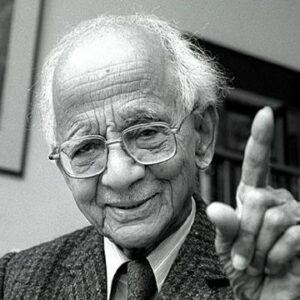Nirad C. Chaudhuri was one of the best-known Indian fiction writers of the 20th century. He was the only Indian to ever win the prestigious Duff Cooper Memorial Award. He was born in British India, and his writings show the history of India during British rule. He was a great writer who, over the course of a long and successful career, had written many novels and biographies that won him many awards and praise. He was a fiercely independent man who never feared getting into trouble. In fact, the dedication to his first book was written in a way that was sure to anger the Indian official class. But this man didn’t give a crap what other people thought of him. That made him different from many other writers at the time. He was good friends with Khushwant Singh, a writer, and novelist who was just as fiery as he was. Chaudhuri was very upset by the hypocrisy he saw in Bengali society, especially when it came to caste and social differences, and he was very angry about it in his writing. He knew a lot of people in politics, which not only made him unhappy with Indian politics but also got him into a lot of trouble.
Early years and childhood
His father was a lawyer in a small town, and his mother, like most women of the time, didn’t know how to read.
After going to Kishorganj and Calcutta for elementary school, he went to Ripon College in Calcutta. Then he went to the Scottish Church College to study history as his undergraduate major.
He graduated with honors from that school.
He signed up for an M.A. at the University of Calcutta, but he didn’t show up for all of his exams, so he didn’t pass the course.
Nirad Chaudhuri’s Career
His first job was as a clerk in the Indian Army’s Accounting Department. He also started writing articles for magazines around the same time. His first article, about the Bengali poet Bharat Chandra, was published.
His job as a clerk wasn’t very interesting to him. His career as a journalist was going well, so he quit his job in the Accounting Department and became a journalist full-time.
By this time, he knew the writers Bibhuti Bhushan Banerjee and Dakshinaranjan Mitra, with whom he was living. He started running the popular English magazine “Modern Review” and the Bengali magazine “Prabasi.”
He also started the Bengali magazines Samasamayik and Notun Patrika in the 1920s. These magazines did get a reputation for having good writing in them, but they didn’t last long.
In 1938, he was hired as Sarat Chandra Bose’s secretary. Bose was a leader in the Indian nationalist movement and a politician. Because of this job, he met political leaders like Mahatma Gandhi, Jawaharlal Nehru, and Subhas Chandra Bose.
Working with politicians up close taught him a few things about Indian politics and made him doubtful about the country’s future. He lost a lot of faith in the Indian political system.
Even though he worked as a secretary, he kept writing Bengali and English articles for newspapers. Before he started working for the Delhi branch of All India Radio in 1941, he also worked as a political commentator for the Calcutta branch.
He had always been a journalist, but he didn’t write his first book in English until he was 53. It was called “The Autobiography of an Unknown Indian,” and it came out in 1951. When the book came out, it caused a lot of trouble because it upset a lot of Indians, especially those in the bureaucratic class.
He lost his job at All India Radio because of the book. Government rules said that government workers couldn’t write memoirs. He also lost his pension and couldn’t get work as a writer.
But things changed for him when the British Council and the BBC asked him to come to England in 1955 and give lectures for the BBC. He agreed and gave eight lectures about life in England, which were later put together in a book called “Passage to England.”
In 1965, he put out “The Continent of Circle,” a book of essays in which he talked about Indian society from a sociological and psychological point of view. In the book, he gives a different point of view that is different from the “pacifist” theory that most people think of when they think of India.
In 1970, he moved from India to Oxford, England. During his time there, he thought about and wrote about India.
He wrote a lot, and he kept writing until the end of his life. His autobiographical book “Thy Hand, Great Anarch!” came out in 1987. It was a follow-up to “The Autobiography of an Unknown Indian,” which he had written decades before.
Works of note
People say that his first book, “The Autobiography of an Unknown Indian,” is his best work. It was a book about his life, from when he was born in a small town to how he changed as a person in Calcutta. The book caused a lot of trouble, but it also made him a very well-known author.
Awards & Achievements
In 1966, his book, “The Continent of Circle,” was the first Indian book to win the prestigious Duff Cooper Memorial Award. Chaudhuri was the first Indian to win the award.
In 1975, he won the Sahitya Akademi Award for his book “Scholar Extraordinary,” which was about Max Muller.
Personal History and Legacies
In 1932, he married Amiya Dhar, who was also a well-known author. They had three sons together.
He lived for a long time and did a lot. He kept writing right up until the end of his life. His last book came out when he was 99 years old. He died of natural causes in 1999, just two months before he would have turned 102.
Estimated Net worth
Unknown.


